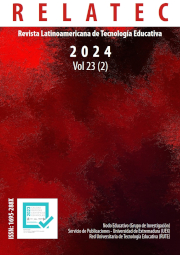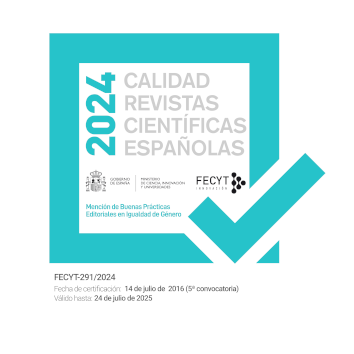Avaliar a aprendizagem baseada em jogos em contextos informais utilizando a ciência dos dados
DOI:
https://doi.org/10.17398/1695-288X.23.2.9Palavras-chave:
Alfabetización Informacional, Desinformación, Ciencia de Datos, pensamiento críticoResumo
O aumento da aprendizagem baseada em jogos digitais (GBL) gerou interesse em explorar a sua eficácia, uma vez que a sua combinação complexa de narrativa e interatividade torna difícil avaliar em que medida um jogo de vídeo atinge os objectivos de aprendizagem pretendidos. Este desafio aumenta exponencialmente quando a sessão de jogo ocorre espontaneamente em ambientes informais, sem a supervisão de educadores ou a possibilidade de avaliar os conhecimentos e competências prévios do jogador. Este artigo apresenta uma metodologia de análise de experiências ABJ baseada na utilização da ciência dos dados e nas funcionalidades de recolha de informação oferecidas pelas actuais plataformas de criação de jogos de vídeo. A estratégia é aplicada à análise de um simulador de redes sociais criado para promover a literacia da informação, enquadrado no jogo Julia: A Science Journey. O sistema registou dados de 436 jogos jogados por 112 jogadores diferentes durante seis meses e recolheu informações sobre a capacidade de reprodução, a identificação de notícias falsas e a velocidade de reação. Os resultados sugerem que os jogadores aprendem a identificar as notícias falsas de forma mais eficaz e rápida à medida que vão acumulando jogos. O sucesso na identificação da desinformação está também relacionado com o tema, uma vez que os embustes ligados a conteúdos científicos são mais facilmente reconhecidos do que os relacionados com controvérsias políticas.
Downloads
Referências
Alonso-Fernández, C., Calvo-Morata, A., Freire, M., Martínez-Ortiz, I., & Fernández-Manjón, B. (2019). Applications of data science to game learning analytics data: A systematic literature review. Computers & Education, 141, 103612. https://doi.org/10.1016/j.compedu.2019.103612
Bayeck, R. Y. (2020). Examining Board Gameplay and Learning: A Multidisciplinary Review of Recent Research. Simulation & Gaming, 51(4), 411–431. https://doi.org/10.1177/1046878119901286
Cabezuelo Lorenzo, F., & Manfredi, J. L. (2019). Posverdad, fake-news y agenda política en el discurso de Trump en Twitter. Historia y Comunicación Social, 24(2), 471–483.
Cano, A. R., Garcia-Tejedor, A. J., Alonso-Fernandez, C., & Fernandez-Manjon, B. (2019). Game Analytics Evidence-Based Evaluation of a Learning Game for Intellectual Disabled Users. IEEE Access, 7, 123820–123829. https://doi.org/10.1109/ACCESS.2019.2938365
Connolly, T., Stansfield, M., & Hainey, T. (2009). Towards the development of a games-based learning evaluation framework. In Games-based learning advancements for multi-sensory human computer interfaces: Techniques and effective practices (pp. 251–273). IGI Global.
DeJong, S. (2023). Playing With Fake News: State Of Fake News Video Games. International Journal of Games and Social Impact, 1(1), 94–111. https://doi.org/10.24140/ijgsi.v1.n1.05
Dyson, M., & Haselgrove, M. (2000). The effects of reading speed and reading patterns on the understanding of text read from screen. Journal of Research in Reading, 23(2), 210–223. https://doi.org/10.1111/1467-9817.00115
Fernández Galeote, D., & Hamari, J. (2021). Game-based Climate Change Engagement: Analyzing the Potential of Entertainment and Serious Games. Proceedings of the ACM on Human-Computer Interaction, 5(CHI PLAY), 1–21. https://doi.org/10.1145/3474653
Gee, J. P. (2007). What video games have to teach us about learning and literacy (Rev. and updated ed). Palgrave Macmillan.
Gómez-García, S., & Carrillo-Vera, J.-A. (2020). El discurso de los newsgames frente a las noticias falsas y la desinformación: Cultura mediática y alfabetización digital. Revista Prisma Social, 30, 22–46.
Hammer, J., To, A., Schrier, K., Bowman, S. L., & Kaufman, G. (2018). Learning and role-playing games. In Role-Playing Game Studies (pp. 283–299). Routledge.
Hauge, J. B., Berta, R., Fiucci, G., Manjon, B. F., Padron-Napoles, C., Westra, W., & Nadolski, R. (2014). Implications of Learning Analytics for Serious Game Design. 2014 IEEE 14th International Conference on Advanced Learning Technologies, 230–232. https://doi.org/10.1109/ICALT.2014.73
Lewandowsky, S., & van der Linden, S. (2021). Countering Misinformation and Fake News Through Inoculation and Prebunking. European Review of Social Psychology, 32(2), 348–384. https://doi.org/10.1080/10463283.2021.1876983
Maertens, R., Roozenbeek, J., Basol, M., & Van Der Linden, S. (2021). Long-term effectiveness of inoculation against misinformation: Three longitudinal experiments. Journal of Experimental Psychology: Applied, 27(1), 1–16. https://doi.org/10.1037/xap0000315
Mayer, I., Bekebrede, G., Harteveld, C., Warmelink, H., Zhou, Q., van Ruijven, T., Lo, J., Kortmann, R., & Wenzler, I. (2014). The research and evaluation of serious games: Toward a comprehensive methodology: The research and evaluation of serious games. British Journal of Educational Technology, 45(3), 502–527. https://doi.org/10.1111/bjet.12067
McCall, J. (2016). Teaching history with digital historical games: An introduction to the field and best practices. Simulation & Gaming, 47(4), 517–542.
McGonigal, J. (2011). Reality is broken: Why games make us better and how they can change the world. Penguin.
Modirrousta-Galian, A., Higham, P. A., & Seabrooke, T. (2023). Effects of inductive learning and gamification on news veracity discernment. Journal of Experimental Psychology: Applied. https://doi.org/10.1037/xap0000458
Mohsin, K. (2020). Defining’Fake News’. Available at SSRN 3675768.
Pitarch, R. C. (2018). An Approach to Digital Game-based Learning: Video-games Principles and Applications in Foreign Language Learning. Journal of Language Teaching and Research, 9(6), 1147. https://doi.org/10.17507/jltr.0906.04
Roozenbeek, J., Traberg, C. S., & Van Der Linden, S. (2022). Technique-based inoculation against real-world misinformation. Royal Society Open Science, 9(5), 211719. https://doi.org/10.1098/rsos.211719
Ross, A. S., & Rivers, D. J. (2018). Discursive Deflection: Accusation of “Fake News” and the Spread of Mis- and Disinformation in the Tweets of President Trump. Social Media + Society, 4(2), 205630511877601. https://doi.org/10.1177/2056305118776010
Rubio-Campillo, X., Marín-Rubio, K., & Corral-Vázquez, C. (2023). Using in-game analytics to explore learning dynamics of information literacy in a social media simulator. 17th European Conference on Games Based Learning, ECGBL 2023, 556–563.
Sadler, T. D., Romine, W. L., Stuart, P. E., & Merle-Johnson, D. (2013). Game-Based Curricula in Biology Classes: Differential Effects Among Varying Academic Levels: GAME-BASED CURRICULA. Journal of Research in Science Teaching, 50(4), 479–499. https://doi.org/10.1002/tea.21085
Squire, K. (2008). Video games and education: Designing learning systems for an interactive age. Educational Technology, 48(2), 17.
Squire, K. (2021). Making Games for Impact.
Su, Y., Backlund, P., & Engström, H. (2021). Comprehensive review and classification of game analytics. Service Oriented Computing and Applications, 15(2), 141–156. https://doi.org/10.1007/s11761-020-00303-z
Tahir, R., & Wang, A. I. (2017). State of the art in game based learning: Dimensions for evaluating educational games. European Conference on Games Based Learning, 641–650.
Tandoc, E. C., Lim, Z. W., & Ling, R. (2018). Defining “Fake News”: A typology of scholarly definitions. Digital Journalism, 6(2), 137–153. https://doi.org/10.1080/21670811.2017.1360143
Wardle, C., & Derakhshan, H. (2018). Thinking about ‘information disorder’: Formats of misinformation, disinformation, and mal-information. Journalism,‘Fake News’& Disinformation, 43–54.
Wickham, H. (2016). ggplot2: Elegant Graphics for Data Analysis. Springer-Verlag New York. https://ggplot2.tidyverse.org
Yee, N. (2014). The Proteus paradox: How online games and virtual worlds change us-and how they don’t. Yale University Press.
Downloads
Publicado
Edição
Secção
Licença
Direitos de Autor (c) 2024 Xavier Rubio-Campillo, Kevin Marín-Rubio, Celia Corral-Vázquez

Este trabalho encontra-se publicado com a Licença Internacional Creative Commons Atribuição-NãoComercial-SemDerivações 4.0.
Los autores/as que publiquen en esta revista aceptan las siguientes condiciones:
1. Los autores/as conservan los derechos de autor y ceden a la revista el derecho de la primera publicación, con el trabajo registrado con la licencia Creative Commons Reconocimiento-NoComercial-SinObraDerivada 4.0 International (CC BY-NC-ND), que permite a terceros utilizar lo publicado siempre que mencionen la autoría del trabajo y a la primera publicación en esta revista.
2. Los autores/as pueden realizar otros acuerdos contractuales independientes y adicionales para la distribución no exclusiva de la versión del artículo publicado en esta revista (p. ej., incluirlo en un repositorio institucional o publicarlo en un libro) siempre que indiquen claramente que el trabajo se publicó por primera vez en esta revista.
3. Se permite y recomienda a los autores/as a publicar su trabajo en Internet (por ejemplo en páginas institucionales o personales) antes y durante el proceso de revisión y publicación, ya que puede conducir a intercambios productivos y a una mayor y más rápida difusión del trabajo publicado (vea The Effect of Open Access).









